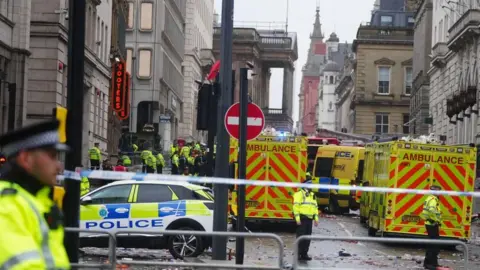BBC News
Senior UK correspondent
 Getty Images
Getty ImagesPolice have been encouraged to consider disclosing the ethnicity and nationality of suspects charged in high-profile cases, after facing mounting pressure over the details they make public.
The interim guidance from the National Police Chiefs’ Council (NPCC) aims to reduce the risk to public safety where there are high levels of misinformation about an incident.
Policing Minister Dame Diana Johnson said the government will want police to release these details in “most cases” in what she welcomed as a positive step.
It comes after authorities were accused of hiding the identities of two men, reported to be Afghan asylum seekers, charged over the alleged rape of a 12-year-old in Warwickshire.
The guidance, which comes into immediate effect, forms part of a wider review of the College of Policing’s professional practice for media relations.
It was developed following consultation with the Crown Prosecution Service (CPS) and Home Office in recognition of “public concerns”, and to ensure police processes were “fit for purpose in an age of rapid information spread”.
Decisions on releasing such information will remain with police forces, with wider legal and ethical considerations also taken into account, the NPCC said.
Verifying a suspect’s immigration status is up to the Home Office, not the police, it added.
Welcoming the new guidance, a Home Office spokesperson said the public, and police forces themselves, want “greater clarity on when, why and how information is released” and the “legitimate and compelling reasons it may need to be withheld”.
The Home Office will authorise the release of “relevant accompanying immigration information” in future cases “where it is appropriate to do so”, they added.
Home Secretary Yvette Cooper told the BBC last week that there needed to be “more transparency in cases” over the background of suspects.
Speaking to BBC Radio 4’s Today programme, Dame Diana, the policing minister, said deciding whether to disclose more details would be a matter for the police and the CPS, but that “we want them to be as open as possible”.
She stressed that the release of any information should not prejudice a fair trial.
As it stands, there is nothing in the College of Policing’s guidance that prevents police giving information about the nationality, asylum status or even ethnicity of someone who has been charged.
But there is nothing that specifically mentions that it should be given either, which is why the information released to the media largely comes at the discretion of the police force. Hence the very different measures taken in recent cases.
In May, when a car ploughed into crowds celebrating Liverpool FC’s winning of the Premier League title, Merseyside Police were quick to reveal that the man arrested was white and British, in order to quash rumours of a terrorist attack in the public interest.
Conversely, the force’s decision not to release information about Axel Rudakubana – the man jailed for murdering Alice Aguiar, nine, Bebe King, six, and Elsie Dot Stancombe, seven, in Southport last summer – allowed false information to spread.
That misinformation was deemed at least partly responsible for the riots in England and Northern Ireland between 30 July and 5 August 2024.
Referring to the riots, Deputy Chief Constable Sam de Reya, the NPCC lead for communications and media, described it as the “real-world consequences” of the information the police release into the public domain.
“We have to make sure our processes are fit for purpose in an age of social media speculation and where information can travel incredibly quickly across a wide range of channels,” she said.
 PA Media
PA MediaIn the high-profile case of the two men charged of the alleged rape of a 12-year-old in Nuneaton, Reform UK accused Warwickshire police of a cover-up after it did not reveal their immigration status.
The police said it had simply followed the official guidance given to officers which did not include sharing the ethnicity or immigration status of suspects.
The prime minister’s spokesperson subsequently said police and courts were operationally independent but the principle was to be as transparent as possible.
Recent months have seen misinformation used to conjure up passionate feelings from people from all sides of the political spectrum – in some cases being taken as fact and leading to violence and disorder.
It is hoped the new changed guidance to disclose details when necessary will go some way to stop this from happening.
But some police officers feel it will force them to reveal the race and nationality of suspects which – they say – could provoke more feelings and potentially trouble.
Ex-Met Police Chief Supt Dal Babu warned of the “unintended consequences” of the new guidance, which he said could lead to more online speculation in cases where these details are not released.
“The danger is there will be an expectation for police to release information on every single occasion,” he told BBC Radio 4’s Today programme.
“I have huge sympathy for my former police colleagues, because they’re in a damned if they do, damned if they don’t situation,” he said.



